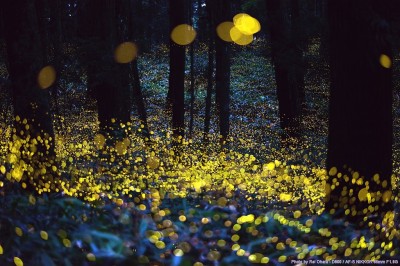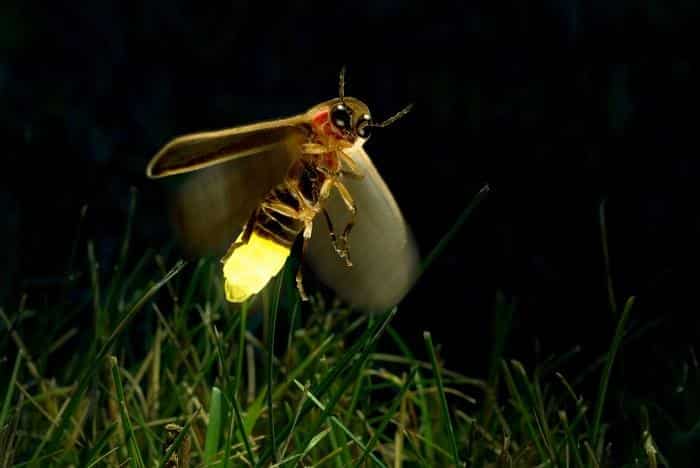
Image source: Flickr
Don’t you miss those warm summer evenings lighted intermittently by the little flashes of fireflies? Many of us have been fortunate enough to enjoy the magic of fireflies and have even seen them up close, a privilege our children may be denied.
Nostalgia aside, it’s quite disturbing that you don’t spot them as often nowadays, at least not in as many numbers. Are they on their way to extinction, or have they just moved away from humans?
The dwindling numbers of fireflies may not be as worrying as that of honeybees from the point of view of food security. But every organism has its place in the ecosystem, and the impact of its absence may be known only when it is too late to remedy.
As a matter of fact, very little is known about the life of fireflies. Scientists who have spent the last few years studying fireflies haven’t been able to uncover all the facts about their mysterious lives. Interest in this natural wonder has been kindled, but how well do we know these creatures of the night, also known as lightning bugs?
Their common name seems quite apt for them, but fireflies are not really flies; they belong with beetles such as the ladybugs.
Their flashing abdomen has nothing to do with fire, either. It shines with a cold glow called bioluminescence. A chemical reaction between a substance called luciferin and an enzyme luciferase makes these little flashes.
Fireflies use their flashing lights for communication, the main purpose being finding suitable mates. Different species have different signaling patterns unique to them.
Why are they disappearing now?
Even though it is not known exactly why firefly populations are rapidly dwindling, the commonly cited and most probable reasons point to the hand of man.
1. Use of pesticides
Use of pesticides, even in the wild patches around residences, may be killing not just mosquitoes but many other small insects like fireflies — or even wreaking havoc on their reproductive system.
Mosquitoes require almost the same living conditions as fireflies, such as hot and humid weather and proximity to water bodies. What is surprising is that, while fireflies are dwindling in numbers, the mosquitoes are on a roll.
Story continues below picture

Image source: SCMP.com
2. Habitat destruction
It’s true that animals that adjust, adapt and acclimatize themselves to the ever-evolving ecology have a better chance of survival. But the rapid development associated with human inhabitation brings about drastic changes in the natural habitat at a faster rate than what other living things can cope with. Fireflies prefer boggy areas because they provide plenty of food for their carnivorous larvae. We fill them up in the name of development. They lay their eggs in the ground in undisturbed areas, but we pave over every bit of ground possible in our garden and neighborhood.
3. Light pollution
Fireflies communicate with each other by flashing their tail lamps. The males attract females and the females welcome the males using light signals. But when the headlamps of our automobiles interfere with this signaling system, how can these poor creatures find their mates?
New Survival Seed Bank™ Lets You Plant A Full Acre Crisis Garden!
While infrequent mating may be causing firefly populations to decrease, the heavy lighting around cities and towns could be driving them away to wooded areas away from people. If that’s the case, we may still have a chance of luring them back to our backyards.
What we can do to bring the fireflies back?
Ecological damages are not easily reversed because they cannot be undone, and only remedied to some extent. But that shouldn’t discourage us from trying. A few of the measures we can take to welcome the fireflies back are:
- Preserve wild hubs – A bit of wilderness left undisturbed in the farthest corners of the garden will welcome these insects.
- Increase tree cover – The female fireflies park themselves on the cracks of tree barks awaiting their dates. They need some privacy.
- Avoid chemical use – Turn to natural pesticides and composting to make your gardens healthier for you as well as the fireflies.
- Reduce mowing frequency – The taller grass will provide the much-needed cover for the adults as well as the larvae.
- Install water features in the garden – They encourage the growth of slugs and worms that the larvae feed on.
- Reduce exterior lighting – Let them have a better chance at increasing their tribe.
Businesses have to flash their signboards to attract customers, but do we really need our outdoors to be lighted up so brightly? If people are educated about how light pollution is driving fireflies away, a collective effort could be made to keep residential hubs dark enough to welcome them back.
Are fireflies useful to us?
Fireflies may not be as “useful” to us in the usual sense as other insects like the honeybees or ladybugs are, but they do contribute to scientific and medical research.
The light production process of these insects is 100 percent efficient without any loss as heat. The spectrum has no infrared or ultraviolet components. It can be employed in energy efficient bio-LEDs.
The chemical reaction that produces their glow is facilitated by ATP, a substance involved in the cell respiration of all the living cells. Hence, the luminescent firefly chemicals may be used to identify abnormal changes in cells, and to mark cancer tissue.
These mysterious creatures may still hold many benefits yet to be discovered. But for the present, isn’t the little bit of magic they add to our lives reason enough to protect them?
How do you attract fireflies to your property? Leave your reply in the section below:
 Off The Grid News Better Ideas For Off The Grid Living
Off The Grid News Better Ideas For Off The Grid Living




